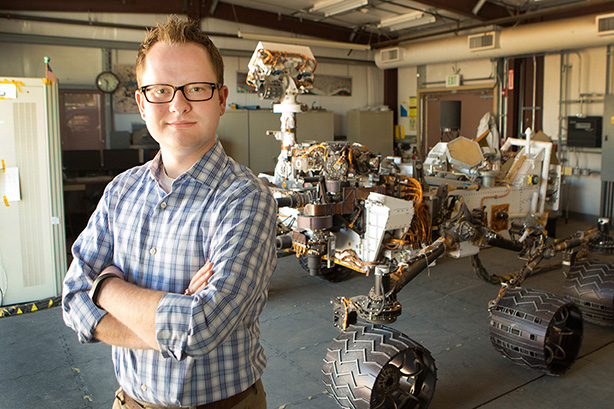Cover Story Sidebar
Financial aid's big impact on students -- and Cornell

Aaron Stehura '09, M.Eng. '10, is a systems engineer at the NASA Jet Propulsion Laboratory in Pasadena, California.
Aaron Stehura '09, M.Eng. '10, was a sophomore in engineering physics at the start of Cornell's campaign in 2006. That same year, Cornell parents Barry and Jill Lafer created a scholarship to benefit students from low-income, single-parent households, and Stehura was one of the fund's first beneficiaries. He also held a Boehringer Family Fellowship.
Now, 10 years later, Stehura is a systems engineer at the NASA Jet Propulsion Laboratory in Pasadena, California – or, as he says, an "eternally curious rover lander and interplanetary explorer."
"Currently I'm working on the Mars 2020 team, building on the heritage of the Curiosity rover and taking its science instruments and landing gear to the next level," he says.
The accomplishments of generations of Cornellians are one measure of the university's success. The achievements of young alumni who benefited from scholarships and fellowships spotlight the impact of Cornell's robust financial aid policies as well as the power of philanthropy in helping to increase student access to a Cornell education.
Over the course of the campaign, donors contributed $388 million for undergraduate scholarships and $350 million for graduate fellowships and professional school student scholarships. They added 674 new endowed scholarships and 198 new endowed graduate fellowships and professional school scholarships.
"Our overall results are nothing short of remarkable," says campaign co-chair Stephen Ashley '62, MBA '64. "The issue of affordability, especially at the undergraduate level, is of national concern, and, while the need for student support remains great, Cornell is now better able to fulfill its commitment to need-blind admissions. We're reaching more students from lower-income families, as well as more students who are first-generation college students. We should take great pride in these trends."
Gains from philanthropy have been especially welcome since Cornell implemented a major financial aid initiative in 2009, according to Barbara Knuth, senior vice provost and dean of the Graduate School.
"As a result of that initiative we have significantly reduced undergraduate student debt and increased affordability, providing greater access to a Cornell education for qualified students from all backgrounds," Knuth says.
Jason Locke, associate vice provost for enrollment, says: "In fall 2015, 6,227 undergraduates representing 43 percent of the undergraduate student population received need-based Cornell grant aid. The average award among first-year students was $37,870. The percent of students graduating with loan debt decreased from 54 percent in 2007 to 43 percent in 2015. The 2014 national four-year college graduate borrowing rate was 69 percent."
And, in January 2016, Cornell received its highest number of freshman applications in university history – nearly 45,000.
"At a time when much of higher education is struggling with attracting enough qualified candidates for admission, Cornell continues to strengthen the diversity and academic quality of its applicant pool," Locke says. "Affordability continues to be a crucial element in Cornell's strategy to attract the best applicants and recruit the most talented and promising students."
"The universities we compete with directly for students are the top universities in the country," Knuth adds. "Students who are admitted to Cornell are often admitted to multiple institutions within a very elite group. Strong financial aid packages enable Cornell to enroll a highly qualified, deserving and diverse student body, and compete successfully against these other schools.
"Generous Cornellians have been and will continue to be critical partners in achieving our ambitions to provide access" to these students, she says.
|
More campaign achievements for student aid • Expanded undergraduate research opportunities through the Rawlings Presidential Research Scholars Program • Boosted funds for student fellowships through the Cornell Tradition • Increased international student scholarships |